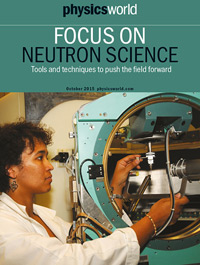By Michael Banks
For physicists who love scattering neutrons off materials, the recent ground-breaking ceremony at the European Spallation Source (ESS) in Lund, Sweden, will have been a long time coming. First proposed more than two decades ago, the ESS will – when it finally opens in 2020 – generate the world’s most intense beams of neutrons and help satisfy demand for these most useful of particles.
Neutron scattering has emerged as a mainstream scientific endeavour over the last 20–30 years, which is one reason why this month sees the first-ever Physics World focus issue on neutron science. We take a look at how researchers at the ESS are designing the facility’s tungsten target, as well as a new neutron source being built in China and how the ISIS Neutron and Muon Source in the UK is looking to bring in more users from industry.
Here is a rundown of what is in the 2015 focus issue on neutron science.
• Sights firmly set on target – The European Spallation Source is developing a unique rotating tungsten target to generate copious amounts of neutrons, Edwin Cartlidge finds out more
• China joins the spallation club – The China Spallation Neutron Source is set to open in 2018, putting the country at the forefront of neutron science, as Ling Xin reports
• Planning for the future – Helmut Schober warns that extra funding will be required to meet the demand of more users
• Targeting industry – Michael Banks travels to the ISIS Neutron and Muon Source in Oxfordshire to find out how the lab is looking to attract more users from industry
• One step beyond – Alan Tennant highlights how the Oak Ridge National Laboratory is leading the way by combining neutron-scattering data with supercomputer simulations
• The other beamline – Jon Cartwright looks at how muon beams continue to provide invaluable insights into magnetic phenomena
• Life as an instrument scientist – Estelle Mossou explains her role at the Institut Laue-Langevin in Grenoble, France
All full members of the Institute of Physics received a print edition of the focus issue along with their copy of the October issue of Physics World. You can also read the focus issue free of charge on your desktop or on any iOS or Android smartphone or tablet via the Physics World app, available from the App Store and Google Play.
I hope you find this focus issue stimulating and please do let us have your comments by e-mailing pwld@iop.org or leaving your remarks below.

The success of the ESS will depend critically on the quality of functioning of the rotating helium gas-cooled tungsten target that has to deal with a high input power of 5 MW from the incident proton beam.
Trackback: Physics World 2015 Focus on Neutron Science is out now – MyPhysNet